#his father was literally betrayed by Napoleon in real life
Explore tagged Tumblr posts
Text
THE COUNT OF MONTE CRISTO IS BLACK.

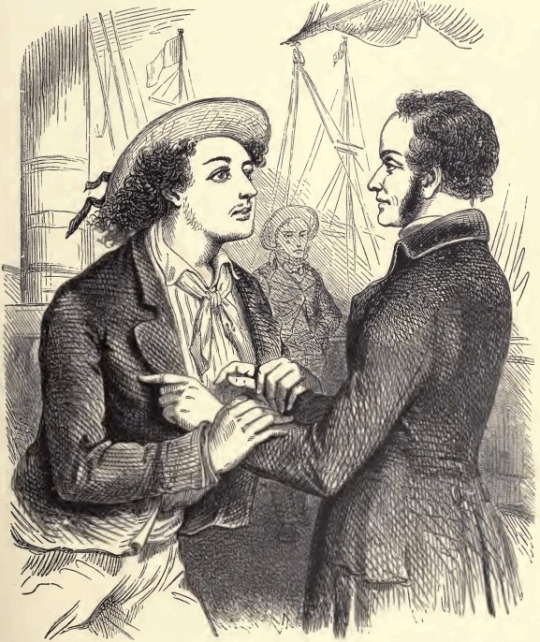
HE IS SUPPOSED TO BE BLACK. 10 MINUTES OF RESEARCH WILL TELL YOU HE IS WRITTEN BY A BLACK MAN AND BASED ON THAT MAN'S BLACK FATHER.

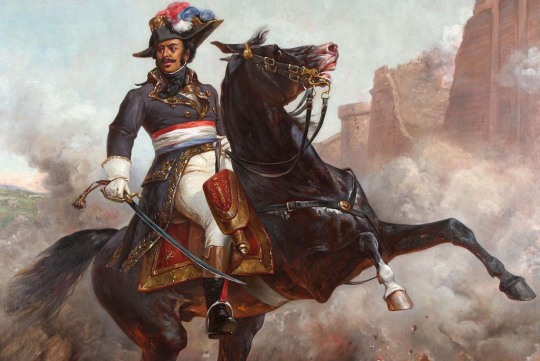
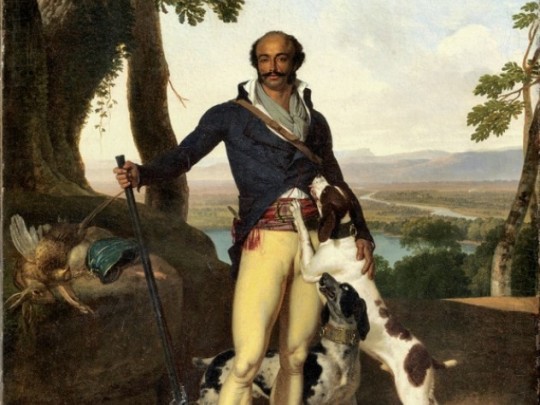
SO HOW IS THERE NOT EVEN ONE SCREEN ADAPTATION WITH A BLACK COUNT?!?!?
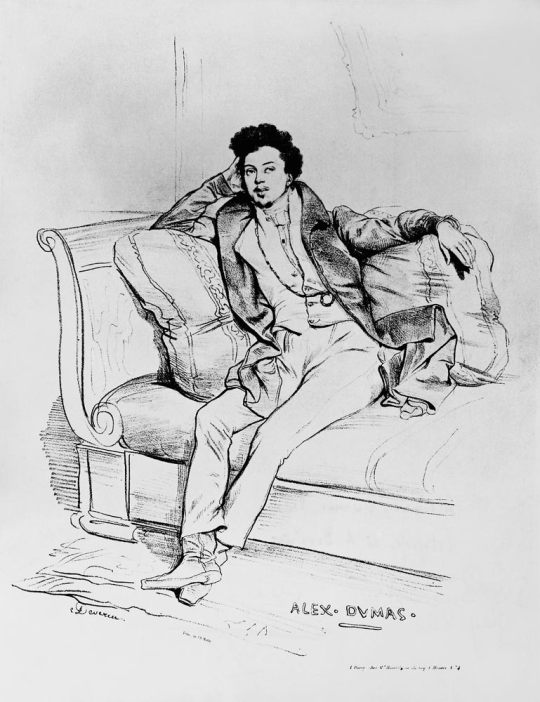
IT IS 2023. THE MEDIUM OF FILM IS 128 YEARS OLD. I HOPE THE NEXT PERSON TO GREENLIGHT A WHITE EDMOND DANTES IS FRAMED FOR TREASON
#original#alexandre dumas#Thomas-Alexandre Dumas#The Count of Monte Cristo#edmond dantes#I just looked up every single actor I could find who's ever played this character on screen and guess what#no black men! where are they! how is there not even one?!?!#all I wanted was to watch a screen adaptation in which the character looks like how he was meant to look!#and now I don't know what to watch because I'm going to be aware the whole time that I'm watching a white man play a Black part!#also if you want to have a fascinating afternoon please research this man and his family history#his father was literally betrayed by Napoleon in real life#I get that when he is described in the book he is not explicitly stated to be black just that his hair and eyes are as dark as possible#but also this was a time of extreme racism in France and the man needed to sell his God damn book! but surely after 250 years#there could be one ONE proper fucking adaptation#he is described as having 'black eyes and hair as dark as a raven's wing' and his life experience mirrors the story of a famous irl man#who spent his life fighting for racial equality and was ultimately destroyed for it.#anyway while it isn't TECHNICALLY inaccurate for the count to be white it is wild that he is ALWAYS played by white men
31 notes
·
View notes
Text
So I was asked about Marmont, by @microcosme11 (I think! Forgive me if I’m wrong, my internet is a bit wild these days and my box all messed up!)
*************
I previously said that I had been “moved” by Marmont. So I’m going to talk about him a little.
Ah, Marmont. Good looking, smooth talking Marmont. Active and loyal. Follows Napoleon everywhere, genuinely admiring him. He has some military and administrative qualities (we owe him, for example, the passing through the Alps, which is quite a feat, and enables the victory of Marengo).
Marmont is very disappointed not to be included in the first promotion of Marshals. What about his service and loyalty ? Napoleon answers that he is still very young, and not that experienced (he was also limited on a battlefield).. In the end Napoleon values him more as a friend than as a general.
When Marmont gets his nomination, in 1809, he greets it as his due.
He’s very vain and leads a legendarily luxurious lifestyle- and to maintain it, he will resort to some dishonest expedients and “misappropriate” funds.
But in the same time he also shows bravery. Handicaped after the battle of the Arapiles, he will fight throughout 1813, getting badly wounded again.
What stains his reputation is of course his behaviour in 1814 and 1815 - by keeping the VIth Corps, loyal to the Emperor, away, he will crush Napoleon’s last hope. Now Louis Chardigny in his book about the Marshals argues that Marmont did not betray for ambition, or for a laugh, or because he was a vain idiot who was just so flattered to be considered a valuable middleman, but because it was the only way to stop the Emperor to go on an impossible war.
So in 1814, does he do France a major service, who knows ? But while it’s acceptable on a political, and even patriotic, level, everybody knows he’s Napoleon’s friend. They literally shared bread. And that is what the people and the army will never forgive him for. He wants to be War Minister - but is literally so unpopular that Louis XVIII will prefer Soult.
His reputation doesn’t get better when he votes Ney’s death.
From now on he’ll live in contempt. From the Ultras who despise him, from the Army, from, obviously, the Bonapartists.. The many privileges and honors he gets during that time don’t seem to make up for it.
The French do not forgive him. He is Duc de Raguse, so guess what, here’s a new word for “betray”: “raguser”. How is his company called ? “Compagnie de Judas.” And it lasts! He doesn’t get a boulevard to his name (Ney has one, you know. He’s been forgiven. It’s easier to be a dead hero than a living traitor).
And then 1830 (new bloody events, riot, revolution, let’s change the King, etc) and Marmont is charged with repressing that. Good luck with that one, because he’s so freaking unpopular that nobody will obey him. So he sells his estate and goes to live in England or anywhere else.
He’ll meet someone, though. A young man. Napoleon’s son. He’ll meet him seventeen times. He will tell him about his father. And the Eaglet has a real hunger to know. And you know, this kid actually looks up to him, he likes him. Marmont finally has someone who doesn’t sneer contemptuously at the very sight of him. Maybe he can redeem himself, somehow, by giving something of his father to a sad young man.
Marmont writes his Memoirs. He tries to justify himself, to explain. Public opinion doesn’t care. Now I haven’t read it, but if I believe Chardigny, there’s a lot of pain and passion in it. That, I can easily imagine.
Marmont dies alone and forgotten, the very last of the men who once were Napoleon’s Marshals.
He was just fourty around the end of the Empire. He lived a very long time in disgrace.
Not saying he didn’t deserve any of it. But in my better days, I just feel sad about all of this.
Napoleon, in the end, will say: “ Posterity will rightfully sully his life; and yet his heart was better than his legacy”.
They were friends, tight friends, and in the end politics destroyed that - but it must have been a real friendship to hurt that bad - because both of them still cared and carried the weight of that betrayal for years.
So yeah, I’m moved.
#questions#napoleonic#@microcosme11#auguste frédéric louis viesse de marmont#there is a boulevard marmont in dijon but im talking about the boulevards des maréchaux in paris#marmont got dumped with bernadotte in the traitors category#god having to make those kinds of choices in 1814 1815#it sucks so bad#i can't put myself in their place and decide#it just really sucks#rant over now
27 notes
·
View notes
Note
Can we have more background on America's upbringing, his birth, etc?
ohoho anon hope you’re ready for a frickin rant cuz there’s sure is a lot to say! XD
Without further ado, here’s a pic of the legit infant of the family with summaries of each era under the cut! If you seek more info/drama, pls send in additional asks or fic requests. 💛💛


American Revolution (age 0-5)
July 4th, 1776.
The 13 original colonies gathered in Philadelphia along with their delegates and signed their breakup letter to England. And on that fateful day, they accidentally created America, a representation of the Original 13′s Alliance/Union.
Baby America played little to no role in the early stages of his life. After all, he was just a fragile newborn who didn’t know how to protect himself. So the Original 13 Colonies fought the American Revolution in his place, leading, spying, negotiating, while baby America fled from the ever approaching frontline with the rest of the Continental Congress. There’s limited to no emotional connection between the states and America during the war, as they’re all too busy not to get killed to sit down and bond.
After the revolution, the original 13, freed from their father nation, are left to govern themselves all while raising a child–a blank canvas of a country they can shape into whatever magnificent and enlightened paradise their mind could dream of. The only problem is, no one could agree on what ‘a great nation’ stood for in terms of specific policies.
The endless chaotic debates and disunity between his semi-autonomous states nearly tore America apart as the boy sat helplessly in growing despair without any power to do anything. Being the literal baby that he was, America’s fate rested entirely in the hands of those who were ‘older’ and ‘wiser.’
The Era of Good Feelings (5-8)
With the end of the War of 1812, the divisive nation-building process finally came to a conclusion.
America and its states entered a time of unity and single-party rule by the Democratic-Republicans. Europe was going up in flames with this dude called Napoleon, so all the foreign superpowers weren’t here to bully America either!
This was the happy and peaceful section of America’s childhood.
America lived with (and was raised by) Maryland and Virginia. As their endless bickering drew to a close, baby America finally began to gain love and attention from the rest of his states as well. They taught him about science, history, and enlightenment ideals. They ruffled his hair and filled his head with dreams, reassuring the boy that he’s destined for greatness; while others like Rhode Island took the time to warn the boy about the darker truth of the world and the curse of immortality.
A lot of problems were swept under the rugs during the Era of Good Feelings, and America himself was still largely powerless compared to the states, but this era is where most emotional bonding happened between the states and America, and where the most fluffy one-shots starring baby America are set.
Civil War (8-12)
The Civil War is when America first learned how to put his foot down and assume his role as the states’ sovereign nation, their rightful leader, instead of a mere child they can push around.
The Civil War Era somewhat resembled the initial nation-building process in many ways. Screaming matches, divisive fights, devastating disasters spiraling out of control. Only this time, America said enough is enough, and he did what it took to make himself heard. He fought uncompromisingly to end slavery and bring the union back together, and to do so America didn’t hesitate to blatantly seize power from the remaining states and people in an almost Machiavellian fashion.
America experienced war for the first time here. Though he didn’t directly fight on the battlefield, the boy’s exposed to the grim toll that came with war and all the hard decisions to be made. America aged rapidly throughout the war and lost a lot of his naivety with each battle, growing into the mold of a cunning superpower by the hour.
When the war ends, the soft and simple-minded baby America will be gone.
Gilded Age (13-16)
In a lot of ways, the states are Alfred’s moral compass. The more detached he is from his constituents, the more America becomes consumed by his own ambitions and desires.
The Gilded Age is a prime example of this.
Following the Civil War and Reconstruction, America had pretty much solidified his position as the head of his states. And since a majority of the states were still trying to deal with their own heartbreaks and aftermath of the Civil War, no one really kept track of this young nation.
And so, America began to explore and expand his power. Politically, geographically, and economically. He got more land, industries boomed, and waves of migrants entered the borders. America pillaged and annexed like an European Imperial superpower; he allowed monopolies and political machines to run rampant with corruption and exploitation of the working class in the name of laissez-faire; he became wealthy, influential and powerful at the expense of millions.
This era most certainly lived up to its name. Gilded. Awful and twisted beneath a thin layer of shining golden paint of prosperity.
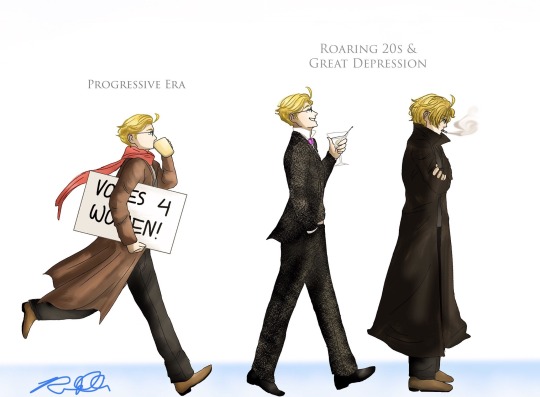
Progressive Era (14-16)
Like we said on previous posts, America had a dark history that cannot be excused, but he is still capable of changing for the better with the right guidance and discipline. In essence, this era took place after the states and his people alike finally began to slap some sense of reason and morality back into America’s skull.
A lot of this time frame overlapped with the Gilded Age because change came very slowly. It’s not like this one sunny day America just woke up and declared hmmm I guess I’m not gonna be a bitch today. Nah, dude. It took a lot of time and effort to get America back on the right track.
During the progressive era, America began to realize how objectively shitty his actions were and tried his best to amend it. He began to break down monopolies and give the working class more political power and bettered their working condition. America fought for women’s rights, preserve the environment, and speak out against imperialism with both passion and remorse.
This is also the time when America and his family finally began to reconcile after the Civil War, and the states gained enough influence in America’s life to keep him on the progressive track.
Roaring 20s & the Great Depression (17)
America got a brief taste of the global stage during WWI and wanted to remain on it through the League of Nations, but the states were like *GASP* NO CHILD U COME HOME RIGHT THIS INSTANT for fear of their baby straying too far from his family again.
So America returned to isolation at the war’s end.
And it was pleasant, at first. A lot of problems were swept under the rugs, but America and the states enjoyed themselves and indulged in extravagant fashions, new cinematic entertainment, and lavish parties of the 1920s. The bonds between them all tightened, even as everything crashed and burnt to hell in the Great Depression.
But despite their deepened connections, the Great Depression was an incredibly harsh time for America and the states. It’s also when America first manifested his hero complex. The young nation saw his brothers and sisters suffer through poverty and horrid weather, and he wanted to be nothing less than a real-life Superman for his family. America wanted to bring optimism, joy, and laughter back to his family in this terribly grim time of depression and make all their problems disappear. America jokes and laugh loudly in attempts to lift the states’ spirits, even though he was struggling against a gritty reality of his own as well, all while assuming more and more power so he can try and lift them all out of this economic devastation.
America’s efforts were heartwarming, but he had also unwittingly set the stage for history to repeat itself.
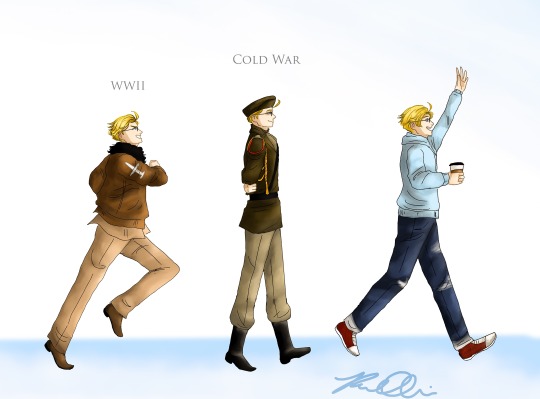
WWII (18)
The world’s descending into chaos again. America had spent months begging his states to let him enter the Second World War, and his elder siblings finally consented their nation’s declaration of war with the bombing of Pearl Harbor.
There’s no stopping their baby chick from traveling far far away from the nest now.
During the war, America found close friends/mentors in foreign nations like Britain and France for the first time during the war, and Canada became nothing less than a brother to him. He fought alongside the allies as a soldier and pulled his economy back into tip-top shape back home. The problem arise when America began to drift further and further away from his states as the war stretched on. The global theatres occupied America’s attention, and the bloody horrors of modern warfare turned him cold.
America will emerge from the war as a victorious superpower, gaining leadership over not only his states but half of the globe as well. Some states will speak up in alarm as America continued to silence dissenters and crank out propaganda even as the war drew to a close, trying to reconnect with their nation. Unfortunately, America failed to listen as his eyes turned toward a former comrade dressed in red.
Cold War (19)
There are a lot of similarities to speak of between the Gilded Age and the Cold War Era. However, one significant difference is that America’s motivation is no longer purely out of selfish ambitions, but also extreme paranoia.
America had tried hard to hide it, but the rise of the USSR made him feel threatened beyond control. The power and wealth he has now were something America had fought vigorously to obtain, and the love & support of his family and friends are what kept America sane through the centuries. The young nation was dreadfully terrified by the mere concept of losing his status as a political and economic superpower or for his states/allies betraying him for the Soviet Union.
It was this irrational but overwhelming fear that blinded America and drove him into acting like an intensely insecure control freak, lending out financial support to Western Europe and installing many domestic welfare programs so no one will feel the need to seek out to Communism. But in the same time, he did not hesitate to resort to coercion should anyone show any signs of dissent.
It took the states a lot of time and efforts to get this nation blinded by paranoia to come back to his senses, but they were still able to to it. After all, America wasn’t evil. He’s sinful, blinded, insecure, and at his worst, selfish and power-hungry. But in America’s core, he’s still that idealistic young man who loves and respects each and every one of his constituents with all his heart.
America isn’t evil, but he does need guidance and restraints from others to prevent his own ambitions, paranoia, and power from corrupting him. America needs those he loves so deeply to speak out in protest when he’s in the wrong, and he needs several helping hands to keep him on the progressive track. Luckily, that’s exactly what his states are here for!
#aph states#aph america#statetalia#states ocs#aph ocs#historical hetalia...?#hetalia#alfred f jones#i drew this way back in july of 2018 thank u for giving me an excuse to use it ;w;#character arc#art by op
242 notes
·
View notes
Text
Sooo... Tumblr ate an ask I had answered, tagged and queued. It likes being funny that way.
An anon had asked what Azula was afraid of in Gladiator, since it’s much easier to understand what Sokka is afraid of. They mentioned Azula wasn’t afraid of Ozai anymore and asked if she feared the Avatar State or spiritual crazy stuff...
I hadn’t even gone into those last two things in my original answer, but now that I’m re-answering, I guess I will... Azula isn’t exactly scared, as things stand, of spiritual things because she’s 100% skeptical of them. That will change in the future, once she learns a little better... but for now, she finds spiritual stuff completely irrelevant and ridiculous, so she’s not afraid of something she belives isn’t even real. As for the Avatar State, at best her knowledge of it is theoretical, and she has no reason, to this day, to believe there’s still an Avatar out there who will show up and smite anyone who messed up the balance of the world. So it’s kind of like asking someone in our world if they’re afraid of Napoleon or something along those lines: however powerful, dangerous and terrible he was, he’s a thing of the past and it’s assumed he’s not coming back :’D so no, Azula isn’t afraid of the Avatar State.
As for what she IS afraid of, Anon pinpointed that she was afraid of losing Sokka and that’s absolutely true and spot-on. Also, she would likely be afraid of losing her bending and that’s also true, though it’s not something she’ll think is possible until, uh... the second-to-last arc in Part 2 :’)
But that’s not the full extent of what she’s afraid of, because she’s afraid of the Fortuneteller’s prophecies coming true. She’s not happy with the one about her mind being powerful but frail, but the one that disturbed her most is the one that predicts she’ll lose everything. While she interpreted that as losing Sokka, which is a fair enough assumption and not at all distant from the truth, there’s more to it than just that: Azula can lose everything she’s ever worked for, all her achievements and all the progress she has made to earn the acknowledgement and recognition she’s sought since the start of the story. And I’d THINK we all know exactly how that could happen... :’)
So yes, she has a lot to be afraid of, and the higher she rises, the worse the fall will be. As confident and determined as she may be, our Princess isn’t yet in a completely stable position in life and in the political spheres of her nation, and until she is, she won’t really be able to put aside these thoughts and fears.
As for Ozai... that she has rebelled against him more openly, as she did with the Seethus situation, doesn’t mean she’s not afraid of him altogether. Otherwise I’m sure she’d be making out with Sokka in Palace hallways without a care in the world just because she’s not afraid of anything :’) so yeah, she’s still slightly afraid of her father, even if she knows he can be defied and she can absolutely get away with that defiance like no one else can. But this doesn’t mean she’s not afraid of the hell he can unleash upon her life... because she’s literally heard her father speak very casually about killing his own son, as if it were no big deal to discuss that kind of stuff in front of her. All of it because Zuko isn’t good enough and Ozai doesn’t care for him, not one bit... so of course, imagine what would happen if Azula, the one who WAS good enough, sometimes better than that, ends up proving she’s actually not up to his standards? Instead of being annoyed and disgusted, as he generally is with Zuko, he’d be outraged and he might even feel betrayed, to a fault, because he DID expect things from her and if she lets him down there’s no telling how far his punishments might go. So... yes, she’s still afraid of him. Not as much as she might have been in the past, not in the same ways... but she’d be pretty foolish to stop fearing Ozai altogether.
And there’s one more thing Azula is afraid of: her mother’s disapproval. I’ll be writing more about this in the story soon, expanding on how far those fears go, but it’ll still be a while before you guys can read it :’D anyways, Azula feels she has come far, evolved as a human being, grown in a lot of ways, and she’s actually pretty happy with who she’s become over the past years. But deep down she thinks Ursa will never approve of her actions and decisions, no matter what she does, no matter who she helps, no matter who she loves. It’s a deeply ingrained fear inside her, one she can’t really shake off, regardless of how accurate or inaccurate it might be. As far as Azula can tell, Ursa would be much like Iroh in her constant support of Zuko for Fire Lord and never giving Azula a chance to prove herself capable of fulfilling that role too. The difference being, of course, that Azula views Iroh as a rival and hardly harbors any good feelings towards him... whereas her relationship with her mother is a complicated mess, and if Ursa was backing Zuko that way Azula probably wouldn’t be able to take it in stride as she does with Iroh.
Of course, things with Ursa are never going to be straightforward in Gladiator. Azula has one very specific perception of her mother, and she doesn’t really know her as well as she thinks she does. And that’s a two-way street, of course: Ursa as well doesn’t know Azula, didn’t know Azula, as well as she shold have, and that’s the main reason why their relationship is the toxic disaster it is. So whether Azula’s fears are justified or not is something to be explored in chapters and arcs quite far from where we are now... but however much progress she has made when it comes to her insecurities, the latent fear of Ursa being right about Azula being a monster hasn’t quite yet vanished.
So... to summarize it, Azula is absolutely afraid of losing Sokka, of losing everything she has worked her ass off for over the past 4-ish years, afraid of not being good enough, whether as a partner for Sokka (something he’ll always consider utterly ridiculous because she’s BEYOND AMAZING! but she’s still beating herself up about being better, inevitably...) or just as a human being altogether. Deep down she’s still afraid her mother could have been right about her being a monster, and that she’d still be one regardless of her best efforts to prove that’s not the case. And of course, she’s afraid of failure, especially of the kind of failure that could result in the aforementioned “losing everything” that would likely happen if Ozai as well decides she isn’t good enough.
#anon#this was an ask#I'm sorry for Tumblr being stupid#Azula's endless pursuit for perfection is depressing as fuck when you think about its roots#like 95% of her problems stem from this#from all the insecurities and crap they've put in her head#whether accidentally or deliberately#and now here we are#poor girl needs a hug or twenty
7 notes
·
View notes